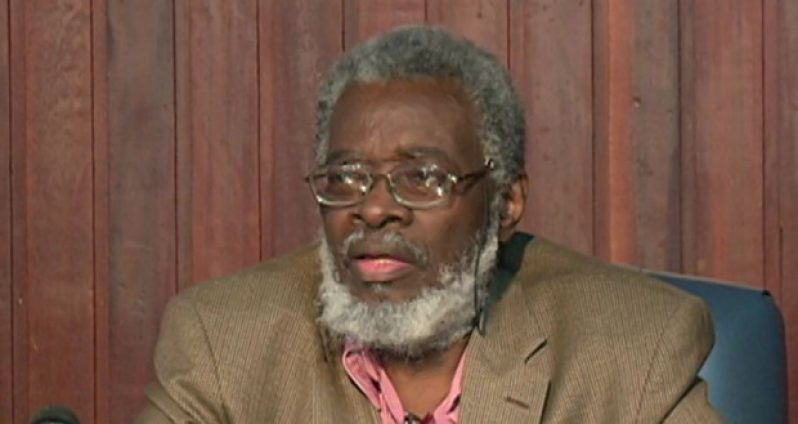THE financial viability of the National Insurance Scheme (NIS) is sound, according to Cabinet Secretary, Dr. Roger Luncheon, who is also the Chairman of the Board of the Scheme.This disclosure was made yesterday by the Cabinet Secretary during his weekly post-Cabinet press briefing when he was questioned about the Scheme’s financial status in light of criticisms.
He said: “The evidence so far is our actuarial review that is done every five years and was recently done and it indeed painted a picture quite different from what the naysayers and detractors would have you believe.”
He, however, pointed out that legislative interventions may be necessary to keep it that way. “Indeed the scheme is financially sound – what the challenge will be is to ensure that it remains that way. I believe that over the years to come interventions will have to be made to contribute to giving that assurance to stakeholders.”
The Cabinet Secretary told the media that the Cabinet was briefed on the performance of the Scheme by the General Manager and a team of Senior Managers who had a “useful engagement… and coming out of that was a better awareness of the performance,” he assured.
DATA ENTRY AND VERIFICATION
Dr. Luncheon also updated the press on the status of the “Data Entry and Verification Project” that the Scheme was mandated by Cabinet to have implemented. He reminded that the project which commenced in June 2014 was completed as scheduled by December 31, 2014 and the objective which was to “convert all paper records to an electronic database of the NIS” was achieved.
“One hundred percent of all outstanding records were entered on the database. That report from the Scheme provided welcomed news for the Cabinet members, many of whom in their outreaches have had to listen to many aggrieved contributors,” he said.
Addressing the inconvenience caused as a result of the delays that resulted from the records not being adequately updated and the benefits the project would have on stakeholders, the Cabinet Secretary said, “It is obvious to Cabinet that this step was important to deal comprehensively with quite a bit of the criticism that the Scheme has attracted by contributors and pensioners about the deficient contribution records … we have indicated to such aggrieved contributors and pensioners that whenever those contributions are indeed found and entered in the database the benefits associated will be computed from the date the contributions were made and not the date the contributions were entered into the system.”
INADEQUATE INFORMATION
He said that the project also revealed that there were over 1.1 million contribution records that could not be verified by end of the project time as there was inadequate information to match them to contributors. He said that what was discouraging “was the disclosure in the report that there were 1.1 million contribution records that were not verified by December 31.
“Cabinet understands what it meant, it meant that just over 1.1 million contributions were received by the Scheme but its beneficiaries, an undisclosed number, were not receiving benefits from those unverified contributions. Cabinet felt this as an untenable situation and agreed that incisive action was necessary… these contributions lacked basic information: name and numbers of the contributors to be credited with these contributions.”
Pointing out that the Scheme on its own is unable to rectify this deficiency; Dr. luncheon said that the management of the NIS was advised to engage the public with a view to allocate the contributions in the best way possible.
“Cabinet instructions were to move ahead with a campaign that would assist the Scheme in addressing the situation … Cabinet clearly saw the need for going public. The feeling was that there had to be an exercise with a public component that would essentially assist the Scheme in identifying those contributors who may have deficiencies in their contributions records and if it can be mapped with contributions received by the Scheme and then could be so allotted then they could get the benefit and that benefit that would not be related to the time that the contribution was entered but when it was received by NIS,” he stated.
Commenting on other issues facing the Scheme, the Cabinet Secretary pointed to the inability of the NIS to adequately collect on its debt and the need to improve its public image. “The solvency of the Scheme and the collection of debt – these are other matters that will have to be tendered to but on the front burner was the thrust to take care of your image. It shows that you are attracting criticisms by aggrieved contributors about being denied their benefits that they have earned,” he said.
LEGISLATIVE CHANGES
He also saw the possibility for legislative changes to reduce the decision-making powers of the Board and creating a more responsible response to the Scheme. “Right now significant powers repose in the Board. I have a fear that the Board ought not to be the sole repository … I feel there is still room for improvement and thinking along the lines of legislation amendment to give a greater role for the National Assembly in determining some of the decisions that right now, by the very act, are discharged by the Board,” he said.



.jpg)









